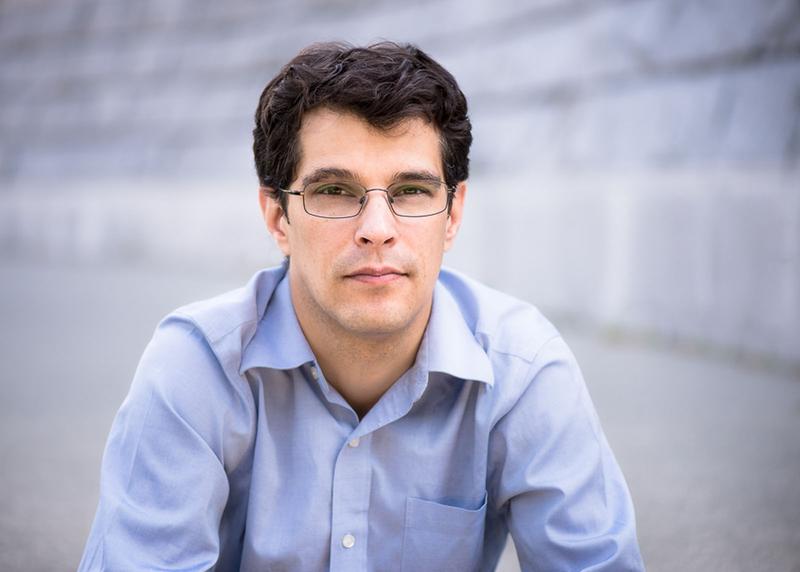
The investigation and subsequent firing of Steven Galloway has made waves across the Canadian literary landscape, including here at UVic. Photo by Nancy Lee provided by The Ubyssey
Both current and former UVic Writing department faculty members have signed a controversial open letter in support of Steven Galloway, the former UBC Creative Writing chair. Galloway was fired last year after an investigation into “serious allegations” that were made against him, including allegations of sexual assault and harassment.
A full timeline of events is included at the end of this article.
The letter, signed by literary heavyweights such as Margaret Atwood and Joseph Boyden, says the allegations have severely damaged Galloway’s reputation and affected his health, and calls for “due process and fair treatment for all” in the university’s handling of the case.
There are three current UVic faculty members who have signed the letter, published on Nov. 14: writing professor Bill Gaston; writing professor Tim Lilburn; and Lee Henderson, associate professor and director of the Professional Writing minor.
The letter has drawn controversy since its publication, with some saying it decentres the experience of sexual assault survivors and goes too far in supporting Galloway instead of the complainants.
A UVic Writing student, who is a survivor of sexual assault, agreed to speak with the Martlet over email on the condition that they remain anonymous. They said their immediate reaction to the letter was “shock and an almost immediate sense of betrayal.”
“I think this letter effectively feels like a way to silence victims,” the student said. “I understand that this was not the intention of the letter, but the way the letter was written and the vocal support behind Galloway does not come across in any way as support for victims.”
The student said that they would have less of a problem with the letter had it been more specifically about UBC’s mishandling of the case. “But this letter is about Galloway and the way UBC treated him . . . For the letter to point out the fact that Galloway has not been convicted is not a mark of his innocence.”
The Martlet reached out to Henderson, Gaston, and Lilburn for comment. Henderson declined, and Lilburn did not return emails or phone calls.
Only Gaston gave a statement, albeit a brief one. “What everyone involved in this has in common is that we all meant well, and mean well,” Gaston said. “I hope that we all can learn from this situation.”
On a Nov. 24 episode of CANADALAND’s Short Cuts podcast, co-host Sheila Heti said she signed the letter at Henderson’s request, even though she had no relationship with Galloway.
“I got an email from a friend of mine, Lee Henderson…who’s a friend of Steven Galloway’s,” Heti said. “He wrote me a letter saying, ‘We have this petition where we’re gonna ask UBC to have an independent investigator [look] into how the Steven Galloway case was handled. Would you sign?’
“My context for looking at the letter was, ‘here’s a favour for a friend, my friend wants me to sign a letter,’” Heti said. “I have no feelings about Steven Galloway. My feelings were for Lee.”
“It was very hard for me to say no to Lee, who was in distress about his friend.” Heti has since had her name removed from the letter, saying on the podcast that it “effaces the existence of the women that complained.”
Later in the recording, Heti said, “If I was somebody looking at this letter, and I saw all these writers putting their names down . . . and no mention is made of the women, that is hurtful and that is not helpful.”
Maureen Bradley, Writing department graduate advisor and associate professor, said that from what she’s read, the case looked like “a fiasco” for those involved.
“I don’t think anyone tried to cause anybody else any pain,” she said. “There are a bunch of people upset about their friend, and they spoke up.”
Bradley suggested some Canadian writers might not be aware of the power their voices hold, and therefore are not aware of how signing the letter could silence those who’ve experienced sexualized violence.
“I don’t think they see themselves as this big scary establishment,” she said. “In fact, I think a lot of us see ourselves as the underdog and the outsider, so it’s very interesting to have it pointed out to some folks that, you know, yes, relative to young students and unpublished writers, yes you do hold some privilege.”
David Leach, UVic’s Writing department chair, said that the three professors signed the letter as members of the literary community, and that there was no department stance on UBC’s handling of the case. However, he agreed with some of the letter’s detractors, saying that it “didn’t have the intended effect, given its timing and given its wording.”
Leach said that if any students have concerns about the letter and who signed it, he has an open door policy, “literally and figuratively,” and that they can speak with him about it.
On Nov. 23, a statement issued through Galloway’s lawyer said that he admitted to having an affair with one of his students, but said the allegations of sexual assault are unsubstantiated.
The UVic writing student said this was only cause for more concern. “Honestly, I don’t trust what [Galloway] has to say,” they said. “The fact that he had an affair with a student makes me question what else he has done. And, it makes me believe that UBC was probably right in firing him.”
When asked if the statement changed anything for him or UVic’s Writing department, Leach said it’s still a UBC matter. “While the lawyer’s statement adds some concrete details, there are still a lot of absent facts, missing voices and open questions.”
A timeline of the Steven Galloway controversy:
Nov. 18, 2015: Steven Galloway, chair of UBC’s Creative Writing program, is suspended with pay following “serious allegations” and a pending investigation. UBC does not state what these allegations are.
Dec. 4, 2015: UBC announces that Mary Ellen Boyd, a civil litigation lawyer, will be looking into the allegations against Galloway.
April 25, 2016: Boyd gives her report to Gage Averill, the UBC Dean of Arts. Galloway does not dispute any of the critical findings, according to a Ubyssey report published June 22.
June 21, 2016: Galloway is fired by UBC after facing “serious allegations of misconduct.” A statement from VP External Relations Philip Steenkamp to the Ubyssey cites “a record of misconduct that resulted in an irreparable breach of trust.” The faculty association, however, says “all but one of the allegations, including the most serious allegation . . . were not substantiated.”
Nov. 14, 2016: An open letter signed by approximately 90 members of the Canadian arts community—including Margaret Atwood, Joseph Boyden, and David Cronenberg—is published. The letter says Galloway’s health and reputation have been damaged by UBC’s actions, and calls for the university to establish an “independent investigation” into how Galloway’s case was handled. It subsequently draws criticism for what some see as emphasizing misconduct around Galloway’s treatment over the experiences of sexual assault survivors.
Nov. 23, 2016: In a statement from his lawyer, Galloway apologizes for “engaging in inappropriate behaviour with a student,” citing an extra-marital affair that lasted two years. The statement says that Boyd found “a balance of probabilities” that Galloway had not committed sexual assault, and that both Galloway and his lawyer have “grave concerns” with UBC’s investigative process.
Nov. 24, 2016: One of the complainants in Galloway’s case releases a statement through her lawyer, saying that her complaint to the university was not about a consensual affair with Galloway, but in fact said that Galloway “sexually harassed and sexually assaulted” her.






